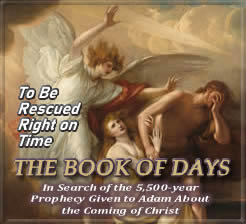A Still Small Voice (Cont’d)
To Know God’s Ways
The Bible provides us with a never-ending litmus test in our ongoing attempts to solve the riddle of why God acts the way He does. Again and again, the Scriptures declare that while many people saw God’s actions, very few came to understand why He did what He did. As it written: “God made known His ways to Moses, His deeds to the people of Israel.”1 In other words, the people of Israel only saw God’s actions and therefore understood God only on a surface level, like children who see what their parents do but never really understand why they do what they do. Moses, by contrast, came to know God’s ways; he came to know why God did what He did, and therefore He understood God on a much deeper level. Unlike the other kids in the family, Moses came to know why God acts the way He does, and as a result, he was much better able to anticipate and predict how God would act in future situations.
It is precisely this kind of awareness that I’m seeking to investigate in this present work. That’s why I’m asking the question: When we think of how the God of The Bible acts, what do we usually think of? Whether we consider ourselves a believer or a skeptic, this question is of paramount importance. In either case, we can’t help but be perplexed by the apparent inconsistencies we encounter in The Bible. But if we can come to a better way of interpreting God’s actions, we may come to a clearer understanding of many of our most pressing issues as a society, such as: If we consider that nations endure while individuals come and go, does that mean God is more concerned with the destiny of nations than individuals? And just how relevant are the actions of a single person in the overall scheme of God’s plan? After all, while God obviously revealed Himself to men like Moses and Elijah, isn’t it true that God was more concerned with the fate of nations like Israel and Judah?
Story Continues Below
Says Richard Price—the founder and CEO of Academia.edu—on his podcast In Depth With Academia:
On Earth as It is On Heaven: The Promise of America, Technology, and the New Earth is:
To hear Price’s book review of On Earth as It is On Heaven, CLICK HERE.
To watch author and historian W. Kent Smith discuss the contents of his book On Earth as It is On Heaven, at the Sacred Word Revealed Conference ‘23, hosted by Zen Garcia, CLICK BELOW.
Story Continues From Above
With Scripture as our reference point, it appears as though, while God is, and always will be, the Lord of the Nations, He understands all too well that nations can’t respond to His still, small voice; only individuals can do that. Nations can’t yearn for truth, freedom, and justice; only individuals can do that. Nations can’t strive to live according to the rule of law and the liberty of conscience; only individuals can do that. And if that’s true, then it turns out that, paradoxically, the individuals who comprise the nations—those puny individuals who come and go so swiftly—are, and always will be, the foundation upon which even the most enduring nation is built.
That’s also why the technology of a nation is so critical in the overall scheme of God’s plan—first, because the power of technology enables individuals to rise above the more mundane aspects of society that has characterized so much of world history; and second, because technology is rarely the product of groupthink but, rather, is the brainchild of a gifted individual who brings to bear all that he or she has distilled from the society in which they have been nurtured and trained.
Be that as it may, while many who claim to believe in The Bible have no problem with God’s still, small voice speaking to the prophets of old, they still can’t help wondering: Is this method of divine communication still relevant in a modern setting? After all, it’s long been contended that since the curtain fell on the days spoken of in The Books of Acts, God no longer takes an active part in the destiny of individuals or nations. Whereas God performed signs and wonders on behalf of biblical nations like Judah and Israel, those days are long gone, never to return again. Right?
Of course, if we believe in Scripture, we’re forced to anticipate some kind of future manifestation of God’s intervention on behalf of Judah and Israel because clearly they’re major players in The Book of Revelation. Therefore, the question should be rephrased, and more importantly, rephrased in the context of this ebb and flow of God’s way of doing things. Simply put: From those days described in Acts until the days in Revelation, has God “gone underground,” as it were? After the nations of Judah and Israel failed so miserably to live up to God’s call, did God stop guiding the destiny of individuals or nations? And if by chance He hasn’t stopped, which individuals and nations is He still guiding?
Ironically enough, if The Bible remains our touchstone, we have to agree that God has never abandoned His habit of choosing certain individuals or nations to fulfill His purposes on the stage of world history. The only questions that remain, then: Are there clues that point to such individuals or nations? And if there are clues, then how do we account for this interplay of God sometimes acting in obvious ways, while at other times acting inconspicuously?








